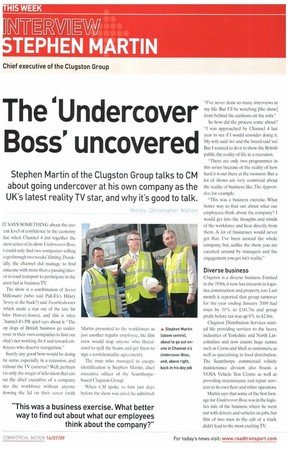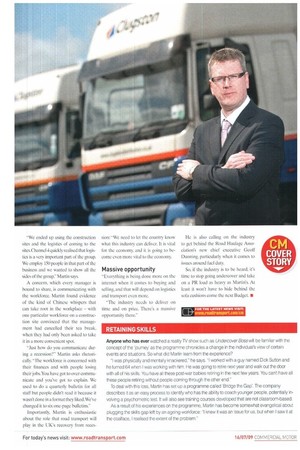The 'Undercover Boss' uncovered
Page 18

Page 19

If you've noticed an error in this article please click here to report it so we can fix it.
Stephen Martin of the Clugston Group talks to CM about going undercover at his own company as the UK's latest reality TV star, and why it's good to talk.
IT SAYS SOMETHING about the cur:ent level of confidence in the economy :hat when Channel 4 put together the atest series of its show Undercover Boss. t could only find two companies willing :o go through two weeks' filming.Thank:Lilly, the channel did manage to find iomeone with more than a passing inter.t.st in road transport to participate in the atest fad in business TV The show is a combination of Secret Villionaire (who said Pall-Ex's Hilary )evey at the back?) and Tnnthleshooter which made a star out of the late Sir John Harvey-Jones), and this is what :hamlet 4's PR spiel says about it: The op dogs of British business go underover in their own companies to find out vhat's not working, fix it and reward em)loyees who deserve recognition."
Surely any good boss would be doing he same, especially in a recession, and vithout the TV cameras? Well, perhaps t is only the magic of television that can )ut the chief executive of a company nto the workforce without anyone flowing the lid on their cover (with Martin presented to the workforces as just another regular employee, the film crew would stop anyone who threatened to spill the beans and get them to sign a confidentiality agreement).
The man who managed to escape identification is Stephen Martin, chief executive officer of the Scunthorpebased Clugston Group.
When CM spoke to him just days before the show was aired, he admitted: "I've never done so many interviews in my life. But I'll be watching 'the show] from behind the cushions on the sofa."
So how did the process come about? "I was approached by Channel 4 last year to see if I would consider doing it. My wife said 'no' and the board said 'no: But! wanted to do it to show the British public the reality of life in a recession.
-There are only two programmes in this series because of the reality of how hard it is out there at the moment. But a lot of shows are very contrived about the reality of business; like The Apprentice, for example.
"This was a business exercise. What better way to find out about what our employees think about the company? I would get into the thoughts and minds of the workforce and hear directly from them. A lot of businesses would never get that. I've been around the whole company, but, unlike the show, you are escorted around by managers and the engagement you get isn't reality."
Diverse business
Clugston is a diverse business. Formed in the 1930s, it now has interests in logistics, construction and property, too. Last month it reported that group turnover for the year ending January 2009 had risen by 31% to £141.7m and group profit before tax was up 8% to £2.8m.
Clugston Distribution Services started life providing services to the heavy industries of Yorkshire and North Lincolnshire and now counts huge names such as Corus and Shell as customers, as well as specialising in food distribution. The Scunthorpe commercial vehicle maintenance division also boasts a VOSA Vehicle Test Centre as well as providing maintenance and repair services to its own fleet and other operators.
Martin says that some of the first footage for Undercover Boss was in the logistics side of the business, where he went out with drivers and vehicles on jobs, but film of two men in the cab of a truck didn't lead to the most exciting TV. We ended up using the construction sites and the logistics of coming to the sites. channel 4 quickly realised that logistics is a very important pan of the group. We employ 150 people in that part of the business and we wanted to show all the sides of the group." Martin says A concern, which every manager is bound to share, is communicating with the workforce. Martin found evidence of the kind of Chinese whispers that can take root in the workplace — with one particular workforce on a construction site convinced that the management had cancelled their tea break, when they had only been asked to take it in a more convenient spot.
"Just how do you communicate during a recession?" Martin asks rhetorically. "The workforce is concerned with their finances and with people losing their jobs. You have got to over-communicate and you've got to explain. We used to do a quarterly bulletin for all staff but people didn't read it because it wasn't done in a format they liked. We've changed it to six one-page bulletins."
Importantly, Martin is enthusiastic about the role that road transport will play in the UK's recovery from reces sion: -We need to let the country know what this industry can deliver. It is vital for the economy, and it is going to become even more vital to the economy.
Massive opportunity
"Everything is being done more on the internet when it comes to buying and selling, and that will depend on logistics and transport even more.
"The industry needs to deliver on time and on price. There's a massive opportunity there." He is also calling on the industry to get behind the Road Haulage Association's new chief executive Geoff Dunning, particularly when it comes to issues around fuel duty.
So, if the industry is to be heard, it's time to stop going undercover and take on a PR load as heavy as Martin's. AL least it won't have to hide behind the sofa cushions come the next Budget. S
FBI, FOR THE LATEST HEWS VISIT wwwtruadtransport.comicm




















































































































































